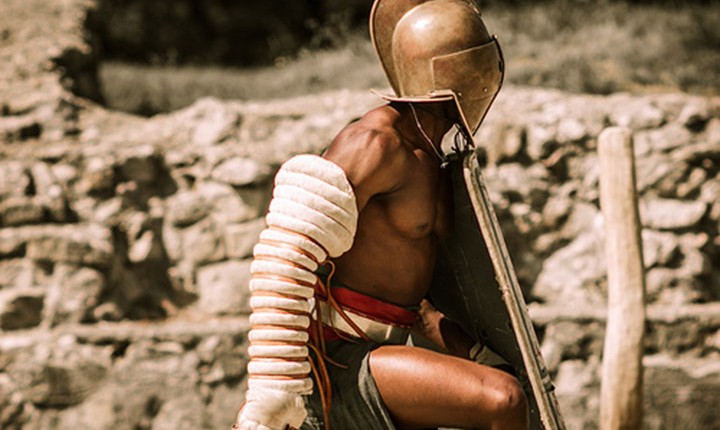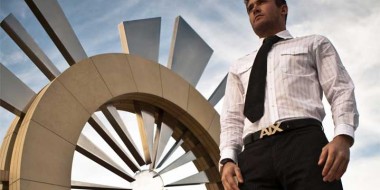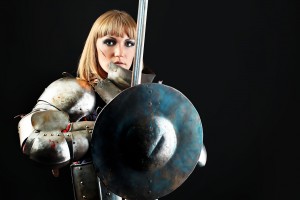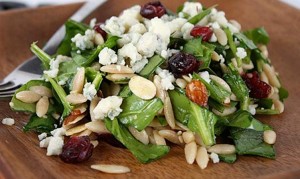Confidence — That Gains Victory
Imagine for a moment—the year is 70 B.C.E., you’re standing in the corridor of the great coliseum of Rome. In the distance, the dull roar of the bloodthirsty crowds echoes and chants indiscernibly. Your senses are heightened, your body has a surge of adrenaline, and you begin to break out in a sweat. You feel the familiar feeling of your heart rate escalate. A lump appears in your throat, and breathing is heavy and stifled. You have one fist clenched around the handle of your gladius sword while the other secures its position on your Thracian combat shield. The roar of the crowd works its way into a frenzy and, though deafening, you struggle to hear their chant.
 As you near closer to the entry gate of the arena, the audience screams, they rip apart their clothing, and alas you make out their chant—it’s the name or your daunting opponent! You’re about to be called to enter the arena. Your adversary is fierce, well trained, and has been in the games for nearly a decade longer than you. How would you feel? Would fear overtake your mind and body, rendering you paralyzed? Or would you relish in the battle that lies ahead? Your thoughts and feelings would be a direct correlation to your training, experience, and sheer will toward gaining victory. If your mental discipline had been in tact and if you had been well trained in your style of combat, you would not lose heart but instead would have confidence to overcome your adversary.
As you near closer to the entry gate of the arena, the audience screams, they rip apart their clothing, and alas you make out their chant—it’s the name or your daunting opponent! You’re about to be called to enter the arena. Your adversary is fierce, well trained, and has been in the games for nearly a decade longer than you. How would you feel? Would fear overtake your mind and body, rendering you paralyzed? Or would you relish in the battle that lies ahead? Your thoughts and feelings would be a direct correlation to your training, experience, and sheer will toward gaining victory. If your mental discipline had been in tact and if you had been well trained in your style of combat, you would not lose heart but instead would have confidence to overcome your adversary.
Life as gladiator was by no means easy, but think about it—is life today any easier?

We constantly are being thrown into “battle” in one form or another, at times with “opposition” seemingly stronger and more dominant. It may come in the form of the downsizing of your corporation, a weakening economy, illness, loss of a loved one, or perhaps the trying circumstances we face on a daily basis of maintaining a family in a society where morality has steeply declined. Whatever may be the battles we are facing, the question remains: Are we training ourselves to be confident and victorious? What are some things that we can to do prepare ourselves mentally, physically, and emotionally? Take a lesson from our aforementioned gladiator. In order for him not to be stricken with fear because the crowds were in favor of his opponent, he had to be confident.
What is confidence? Confidence is a firm belief in one’s powers, abilities, or capacities.
How can we gain confidence? We have to instill within ourselves things that will make us confident.
Learning is imperative. We are never too old learn and take in instruction. How often are you willing to take in further knowledge and deeper understanding? Reading, therefore, is essential. It has often been said, readers are leaders. How often do you pick up a book to learn something that you did not previously know? I’m not talking about reading the comics or the latest edition of Popular Mechanics or Maxim. When we read and learn, we should take in information that will give us more than mere knowledge but will hopefully move us to be better, move us to bold action.
That leads us to our next question: What do we read when we take the time do so? As there is a plethora of worthless reads out there, we should read with the idea of learning something beneficial—something that will enrich our lives and the lives of us those around us. Have you read anything invigorating lately?
Confidence comes also from how we view ourselves
If we do not like the way we feel, look, or carry ourselves, the likelihood is that we will not present ourselves well nor feel confident. We need to be cognizant of what we take into our bodies—not only in a physical way, in the form of food and nourishment, which is very important—but also in the way of our associates: people we invite into our lives, entertainment, the things we read, listen to, or watch on TV. The gladiator credo stresses that when putting good things in, good things will come out. Taking in things that are “good” will produce good results, and the same is true conversely.
 So too is the case when we talk about the physical food we put into our bodies: If we have a diet based on processed foods and so called “fast foods” that are high in fat and sodium, there is a good chance that we will feel sluggish, gain weight, and not feel good about the results produced. However, when your diet is rich in foods that are beneficial to our bodies, such as fruits, vegetables, whole grains, and well-balanced meals, the results will be positive, like a trimmer waistline, higher energy, and an increased sense of awareness.
So too is the case when we talk about the physical food we put into our bodies: If we have a diet based on processed foods and so called “fast foods” that are high in fat and sodium, there is a good chance that we will feel sluggish, gain weight, and not feel good about the results produced. However, when your diet is rich in foods that are beneficial to our bodies, such as fruits, vegetables, whole grains, and well-balanced meals, the results will be positive, like a trimmer waistline, higher energy, and an increased sense of awareness.

Ruins of Ephesus
Archeologist Karl Grossschmidt recently conducted studies from gladiator bones discovered in and around the ancient city of Ephesus and revealed a diet somewhat contrary to popular beliefs. Grossschmidt states, “Gladiators took advantage of the weight gain associated not with meat, but with plants. Carbohydrates provided extra bulk that protected fighters from cuts. Extra pounds from eating grains, legumes, and other plants also ensured that wounds were more prolonged and spectacular to spectators. Gladiators also drank brews made of bone ash or charred wood to harden their bones. It was because of this diet he was able to perform and train at an optimal level and was confident to pursue his opponent regardless of their skill set or years of experience.”
Truly a formidable diet, one that was designed to reach their desired results and give them “the edge,” the confidence, and the stature they needed to compete and battle their opponent in the arena!
Confidence can bring about amazing results if we strive to be diligent in the pursuit of it.
As modern gladiators, we strive, we fight, we make all efforts to achieve confidence in all that we do in life, with optimal results in our grasp. Future “Glory of the Arena” articles will focus on what other qualities and training are needed in our pursuits.
Photo Credit: Valentina_A via Compfight cc
Related Posts
« Confessions of a Pogonophobic Stylist What Can Having a ‘Big Why’ Mean to You? »













